- Home
- L. M. Montgomery
A Name for Herself Page 22
A Name for Herself Read online
Page 22
Well, we are all living yet, so it did not prove fatal, but at the time I certainly thought Theo would choke to death. Theo has a delicate throat.
The truth was that Polly in her haste had iced that cake with saleratus258 instead of confectioner’s sugar.
While I am on the subject I may as well relate the story of the very queerest mistake I ever heard along this line. I often tell this story, but people never believe me. They think I’m romancing. But it really happened, “cross my heart solemn and true.”
I was once visiting at a country Methodist parsonage, the charming little mistress of which was a friend of mine. One day a lot of unexpected company came when there wasn’t a bit of cake in the house – company always does come at such a time, by the way. It’s of a piece with the innate contrariness of things. However, Gwennie left me to talk to the visitors while she whisked into the kitchen and concocted a layer cake which came to the table in due time looking as nice and as innocent as you please.
I shall never to my dying day forget the taste of that cake – neither, I imagine, will Gwennie’s guests. To be sure, one man among them ate every crumb of his section and never flinched. He was of the stuff of which heroes are made. I suppose he thought it was merely some new-fangled flavoring and that he must not hurt his hostess’ feelings by failing to eat it. I read in a paper recently that that same man has been elected to a position of high honor and responsibility in the Methodist church and I don’t wonder. He deserved it if ever a man did, and I am sure he will fulfil its duties with honor and conscientious fidelity.
To return to our mutton259 – that is to say, to Gwennie’s layer cake. Gwennie thought she had flavored it with a generous spoonful of vanilla. What she really had put into it was a certain anodyne liniment, widely known and advertised at the present time.
We found out afterwards that her husband had broken the liniment bottle and had poured what remained of its contents into an old empty vanilla bottle. It was just the same color as vanilla and Gwennie was in a hurry – hence her mistake.
Fortunately it wasn’t poisonous or the Methodist ministry would have lost one of its bright and shining lights.260
“This has been a Jonah day for me,”261 sighed Kitty, who dropped in the other evening.
“What is a Jonah day,” I asked, for the expression was new to me.
“Oh, a day when everything goes wrong,” returned Kitty dolefully. “You know when we were children they used to tell us on such a day that we got out on the wrong side of the bed in the morning.
“I felt cross and grumpy when I got up. It was pouring rain and things were at sixes and sevens all day. I quarrelled with Amy and a letter I expected didn’t come and I tore a big cati-corner hole in my second best skirt, and I broke my hand-painted china hairpin plate and lost my tooth-brush. Oh, you needn’t preach! It wasn’t crankiness or carelessness. It was just the day. It was a Jonah day and things were bound to go wrong.”
I don’t see how Jonah days can come in spring, myself. I should think everything would go right in spite of itself in these splendid awakening days. What a freedom there is in the very air and what a glory on the hills. It warms the cockles of my heart to meander past Government House and see the big fat buds bursting on the trees and the green spears thrusting up out of the mellow earth.262 It is the sweet o’ the year263 and let’s all open our hearts and souls widely to it and drink in its delight – a delight which, thus stored up, will serve to tide us over the dark days that may come to us later.
[On Photography]
Monday, 12 May 1902
“NOW,” SAID POLLY YESTERDAY WITH A DETERMINED expression, “housecleaning is over and likewise the woes of spring dressmaking. So I am going to get out my camera.”
We all tried to look as resigned as possible. We knew what was in store for us. We knew that henceforth, no matter how harmlessly and inoffensively we deported ourselves we were liable to be “snapped” at any hour of the day, in any attitude. We knew that it would not be safe to throw out what seemed to be a dish of simple water because we would probably discover when too late that it was some weird mixture of Polly’s called a “toning solution.” We knew that we would risk the peace of the household if we opened a window without first examining all its ledges. Probably Polly would have a printing frame on it and the wretched thing would tumble down and break the plate. And, worst of all, we knew that we would have to listen to unintelligible jargon about “time exposures” and “hypo” and “frilling” and “negatives” and so on. But as Ted says, when for your sins you are condemned to have a camera fiend in the family, the only thing to do is to bear it philosophically and keep the fact as quiet as you can.
The most reliable test of friendship I know of is to take a snapshot of your friends. Then show it to them. If they forgive you and allow it to make no difference in their friendship then you may be sure that they are true-blue and can be trusted with life itself. There is no test so sure. It will separate the gold from the dross264 every time and though by this heroic measure you will probably narrow your circle of friends down to a very small compass you will have the comfort of knowing that those can be depended upon.
Amateur photographers have to suffer a good deal of equally amateur joking, but when all is said and done there is really no “hobby” which has such a fascination or out of which more pleasure can be extracted.265 Of course one must be in earnest about it and not be a mere dabbler. There is nothing beautiful about a weird snapshot of your friends or a slap-dash exposure where the houses come out canted at an angle that surpasses the leaning tower of Pisa.266 But a really pretty bit of scenery, nicely furnished and properly mounted, reminiscent of a pleasant summer day’s walk or outing is a thing of beauty and a joy forever. Several friends of mine have recently invested in cameras and have asked me for some advice regarding the use and abuse of them. So I will give a few pointers won from experience.
In amateur photography, even more than in anything else, the golden rule is “carefulness.” You simply can’t be careless if you would succeed in producing photos worth having. The most trifling oversight will sometimes spoil a good picture. If you make your exposures in a slap-dash style, if your dark room leaks light, if your hypo solution is not kept religiously apart from your developer, if you do or leave undone a hundred other things you will fail to obtain good results.
In starting out don’t attempt too much at first and recklessly expose half a dozen plates before developing one. Make haste slowly.267 A 4x5 camera is large enough for a beginner. Get all the supplies necessary, for, of course, you will not be content to be a “button pusher,” but will do your own developing and finishing. Above all, get a good dark room lantern. Misplaced economy here will result in worry and disappointment. In spite of some opinions to the contrary, I think a beginner would do well to commence with a slow brand of plates. Indeed, I like the slow plates best at any time. I consider that they yield more artistic results.
In your dark room have a place for everything and keep everything rigidly in its place.268 Dust your plates before putting them in the holders. A camel’s hair brush is used for this, but if some time you can’t find it draw the palm of your hand softly over the plate, taking care that it – your hand – is quite dry. If you are ever where you cannot gain access to a dark room and yet want to change plates, here is a plan I have followed with success. Get into a windowless closet, sit on the floor and get somebody to put right over your head a heavy quilt – a red one if possible. Then have the door shut tightly and change your plate. If in summer this is a fearfully warm job, but it is better than getting your plates light-struck.
Choose your view carefully with an eye to light and shade effects. You will always get better results by using a tripod and taking time exposures, although of course this requires more skill. In regard to exposures no cut and dried formulas are of any use. The time is regulated by the strength of light and the kind of plates used. In this you must simply learn by making mistakes.
Do not take pictures between eleven and three o’clock. The results are never so good.
In developing don’t under-develop. A beginner is fatally apt to, getting alarmed when the picture begins to fade and whisking it out of the solution. Leave it until very dim and indistinct. Wash well before putting in hypo. I let my plates soak for ten minutes. Also leave them long enough in the hypo. The use of an alum solution will prevent “frilling” – which means that the film curls up around the edges of the plate. In cold weather you will have no trouble with this. After your plate is taken out of the hypo soak it in water for half an hour. If not in running water change the water six times. This is very important, as the least bit of hypo left on the film will eventually spoil it. Above all things, be thorough. Don’t be content with “good enough.” Aim at the best.
A pretty effect may sometimes be obtained in a landscape picture by cutting out of white paper a tiny new moon and pasting it properly on the glass side of the negative. The result is a “summer moonlight scene.” You can take pictures by moonlight, by the way. The exposure calls for hours instead of seconds. Generally the result looks more or less like a foggy plate exposed in the usual way, but very beautiful effects have been obtained in this way. However I do not advise beginners to attempt it.
If you want to make a “winter moonlight scene,” here is how you go about it. Take an ordinary negative of some landscape. Don’t have leaf trees in it. Evergreen trees and an old farm house or so make the best picture for this. Place it in the printing frame, film upward. On top of this place a fresh plate, the two film sides together, and back them with a bit of black cloth for greater security. Then hold frame about 18 or 20 inches from gas jet and turn up gas quickly. Time of exposure will vary from 2 to 20 seconds, according to character of light, plate and negative used. After exposure develop the plate as usual. It is called a positive. Paste a full moon in proper position on its back and print off. The sky will come out black while ground and trees will white with – apparently – snow. The effect will be very pretty. I may add that your “positive” is also a magic lantern slide.
Sometimes your camera will play you very odd tricks. I have had some curious pictures result from accidentally exposing the same plate twice. This is how “ghost” pictures are made.269 Once I took a picture of two girl friends of mine standing side by side. Later on I happened to re-expose the same plate on a landscape view. The latter came out very well. The girls were also there, wan, transparent figures with all the background clearly visible through them. It was apparently a perfect picture, which, of course, does not often result by chance.
Well, I hope you will all get a great deal of pleasure out of your cameras this summer. It will be your own fault if you don’t, be sure of that.
[The Moral of May]
Monday, 19 May 1902
THE MORAL OF MAY SO FAR SEEMS TO BE “DON’T PACK your furs away too soon.” Never mind! We may have showers of snow in May, but we don’t have volcanic eruptions at any time of the year. As Ted – or is it Emerson? – says, “There are always compensations.”270
When we were children the phrase “Happy as a queen” expressed for us the highest summit of human bliss. As we grew up we gradually realized that, after all, kings and queens were not a bit different from other people, unless, perhaps, it might be that they had less of a fair chance for ordinary happiness. Nobody, at least, would say “happy as a queen” when they thought of poor little Wilhelmina.271
At our house we have been so interested in her. And so, I think, has everybody. Somehow, she has always seemed such an attractive little bit of royalty and more “really truly” than any other crowned head in Europe – nearer to us, as it were, if only by reason of her youth and her girlishness, which seems to be pretty much the same as in girls not born to the purple. To me, at any-rate, there has always seemed more individuality about Holland’s girl queen than about any other of Europe’s rulers.
During her recent illness even lazy Polly got out of bed half an hour earlier in the mornings to run down and find out from the morning paper how “our little queen” was. And when we found that she was getting better we all felt as delighted as if it were somebody belonging to us. Poor little girl queen, whose short tenure of the sceptre has been filled with so much tragedy!
“I don’t know that I ever really wished to be a queen,” says Polly, “but if I ever did I’m cured of it now.”
“Some day,” said Annette plaintively, “I am going to write a treatise on ‘The Trials of a Country Schoolma’am.’272 It will be a harrowing bit of realism. It seems to be the prevailing impression that we live in clover273 and have nothing to do but draw our quarter’s salary. My treatise shall be devoted to the purpose of telling the truth about us.”
Annette is teaching young ideas how to shoot in a certain Nova Scotian country district, which, for obvious reasons, shall be nameless.274 She had come up to Halifax last week to spend Sunday with us and tell her woes to Polly and Theo and me.
“If a week should pass without somebody telling me that I am doing easy work for big pay,” went on Annette, “I should conclude that I might as well order my ascension robe ‘immediately and to onct.’275
“‘Well, you get your money easy,’ some ratepayer will tell me. ‘All you have to do is sit there and hear lessons and keep the youngsters quiet.’
“I used to argue the matter at first, but I’m wiser now. Facts may be stubborn things, but they are not half so stubborn as fallacies.
“Why, to begin with, I have nine grades in my school and I have to teach a little of everything from investigating earthworms to the study of the solar system. In the wild effort to cram all sorts of research into a short six hours a day I don’t wonder if the children feel like the little boy who was taken to see the biograph.276 ‘I have to look for what’s coming next before I know what went last,’ he said. I feel that way myself.
“Then I get such letters! Tommy’s mother writes me that Tommy is not coming on in arithmetic as fast as she would like. She says he is only in simple reduction yet and Johnny Jones across the road is in fractions and Johnny isn’t half as smart as her Tommy and she doesn’t understand it. And Susy’s father wants to know why Susy can’t write a letter without mis-spelling half the words, and Dick’s aunt wants me to change his seat because that bad Brown boy he is sitting with is teaching him to say naughty words.
“As to the financial part – but I will not begin on that because there is no end to it. Last year I saved sixty-five cents. And I don’t think I was extravagant either. One cannot live by bread alone.277 Those whom the gods wish to destroy they first make schoolma’ams.”278
“But of course,” went on Annette after she had eaten the greater part of a box of chocolates Ted had given her and so felt cheered up, “there are bright spots even in a country schoolma’am’s existence. There are the compositions! They are as good as the funny papers. I always look forward to reading them as a positive treat. One day last week I told the fourth class to write a composition on ‘Birds.’ One boy started out with the sentence, ‘Our cat catches birds.’ Then he branched out and gave me the history, character and accomplishments not only of his private and particular cat, but of every other feline in the neighborhood. But not another word did he say about birds.279
“Another time I told them to write about ships. This same boy wrote ‘A boat is a small ship. Sailing in a boat is pretty nice, but it is better not to do it, because if you go sailing you may be caught in a storm and drowned and then you will come home and lay the blame on the man who built the boat.’”
Annette has a neck chain which is a very pretty idea. I suspect her best young man gave it to her. Gems are set along it at wide intervals and their initials spell “Dearest.” There is a diamond, an emerald, an amethyst, a ruby, another emerald, a sapphire and a topaz. A pet name might be worked out in this way and anyone not in the secret would never suspect it.
Everybody remembers the old-fashioned autograph album
, specimens of which yet survive in out-of-the-way places. It is never heard of nowadays, but its place is taken by various fads and one of these is the “face” book. Get a well-bound sketch book and in it get each of your friends to draw a head of some sort – girl, man, child or animal. It does not matter if they cannot draw at all. They must do their best and the attempts of the non-artistic often prove the most amusing. They should, of course, sign their names to the pictures. The collection when finished is usually most interesting, exceedingly comic attempts being interspersed with the charming sketches of one’s artistic friends.
[Delightful Days]
Monday, 26 May 1902
ONE AFTERNOON LAST WEEK POLLY AND THEO AND I took a day off and went over to Dartmouth.280 We had a delightful outing, too, although we had a hard time to keep Polly from doing crazy things. The spring seemed to have got into her blood and Theo and I took turns keeping an eye on her. We kept the other eye on the beautiful misty blue lakes, the shimmering young green tints on the trees and the velvet emerald of slopes that fronted the sun. We saw the purples on the far away hills and the glinting fir tops that seemed whispering to the sky. We found faintly perfumed blue violets nestling amid the grasses by old stone walls, and we felt as if we had discovered a gold mine when we came upon a green space dotted with dandelions, as if some spring fairy had shaken star-dust over this corner of the world. The ferns were poking their dear curly heads up in sunny corners, and here and there the wild plum hung out its reddish leaves and its lace-like feathery bloom.

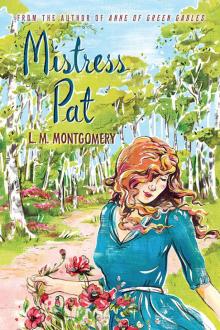 Mistress Pat
Mistress Pat A Tangled Web
A Tangled Web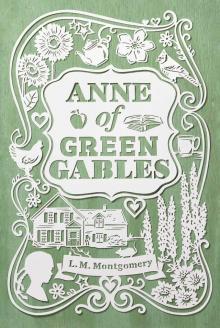 Anne of Green Gables
Anne of Green Gables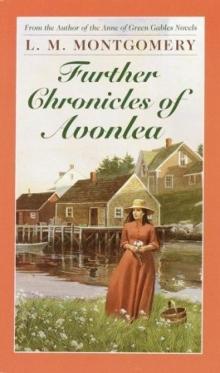 Further Chronicles of Avonlea
Further Chronicles of Avonlea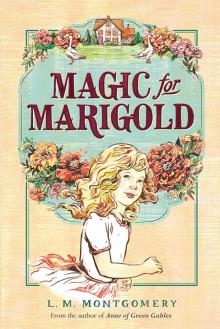 Magic for Marigold
Magic for Marigold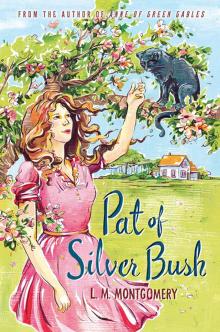 Pat of Silver Bush
Pat of Silver Bush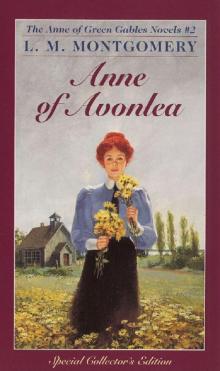 Anne of Avonlea
Anne of Avonlea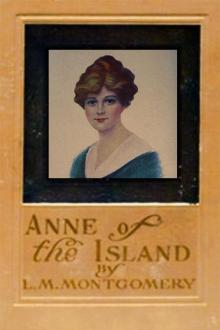 Anne of the Island
Anne of the Island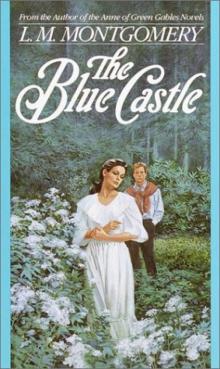 The Blue Castle
The Blue Castle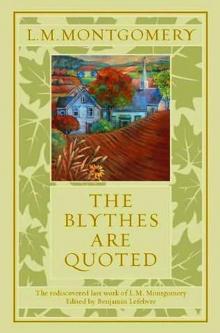 The Blythes Are Quoted
The Blythes Are Quoted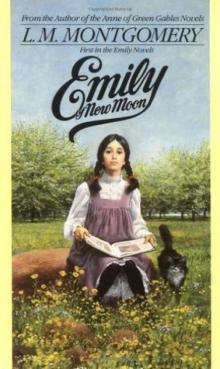 Emily of New Moon
Emily of New Moon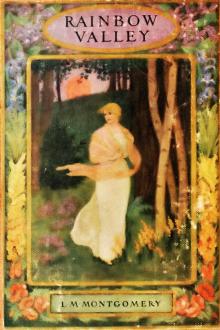 Rainbow Valley
Rainbow Valley Rilla of Ingleside
Rilla of Ingleside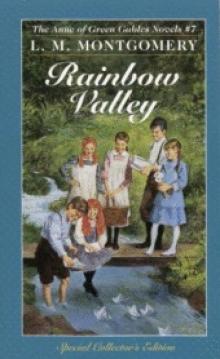 07 - Rainbow Valley
07 - Rainbow Valley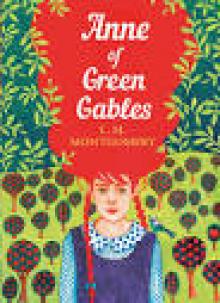 Anne of Green Gables (Penguin)
Anne of Green Gables (Penguin) Emily Climbs
Emily Climbs Emily's Quest
Emily's Quest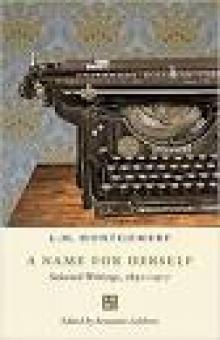 A Name for Herself
A Name for Herself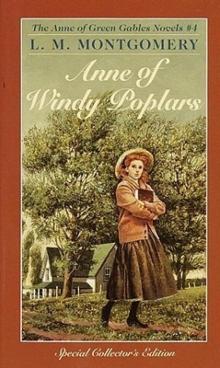 Anne of Windy Poplars
Anne of Windy Poplars The Complete Works of L M Montgomery
The Complete Works of L M Montgomery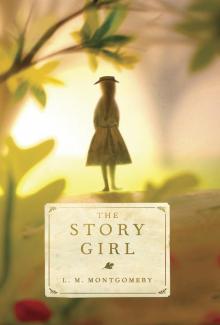 The Story Girl
The Story Girl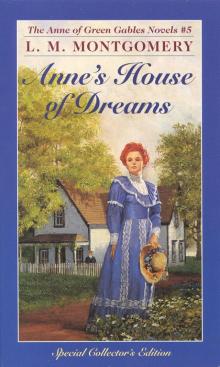 Anne's House of Dreams
Anne's House of Dreams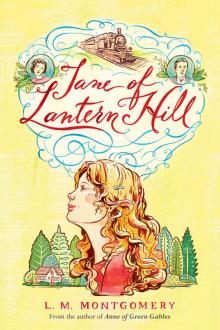 Jane of Lantern Hill
Jane of Lantern Hill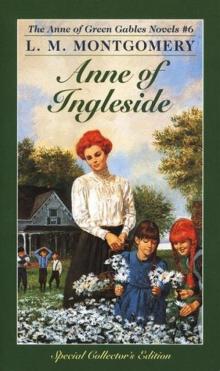 Anne of Ingleside
Anne of Ingleside